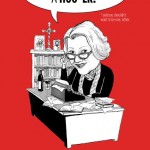My column at First Things this week is a slightly enlarged response to a question I received in an email, from a young man who wrote: “I know the Church puts a high premium on docility, humility and the emptying of self,” he wrote, “but common sense tells me that none of those should involve self-lobotomizing. Please tell me I’m not wrong.”
Good heavens, no—you’re very right. While I may not have the brain of an Aquinas or an Augustine, do I seem to you to be in any way conformist or lobotomized? Quite the opposite of what you fear, Catholicism not only invites the application of reason into one’s faith—it rather insists upon it.
I may be a cradle Catholic given a fair grounding in faith thanks to some nuns and family members, but I have still had to bring my whole self into my explorations of the faith, in order to understand it and to conform—imperfectly, but with firm intentions—to its teachings in genuine freedom, rather than compulsion, and freedom is what the faith brings.
For me, every tenet of Catholicism—including the pro-life teaching—has been one I’ve had to really research, read about, and reason out in my head and through prayer—and the prayer part is absolutely essential, because that is where what you are learning becomes bone-deep; it is the “setting agent,” as it were. In this way—using research, reading, reason, and recollected prayer—I have always come down on the side of Catholic orthodoxy; never because she has simply dished it out and I’ve eaten it, but because she has made a sound argument that fed me in my totality: mind, spirit, and sinew.
Read the rest here
UPDATE:
Two more excellent examples of Faith and Reason kissing and bringing forth something powerful: Take a look at Tim Muldoon’s piece on the film Of Gods and Men:
Our communications-saturated age is characterized by a “if it bleeds, it leads” mentality. Violence among people of different religious groups is played up in headlines because it incites passions and sells newspapers. Yet there is a much quieter, and vastly more common story of friendship among people of different faiths. The exquisitely wrought film Of Gods and Men dares to tell one such story, and thus represents an important contribution to our thinking about faith traditions today. Unlike those who want to assert that religions are jockeying for adherents—like so many political groups competing for power—this film tells the story of men who give themselves totally to their Catholic faith, and yet who look upon the Muslims around them with great love and affection. And the Muslim villagers with whom the monks live and work similarly show great affection toward the monks, showing that friendship can grow even when faiths differ.
And then, read Pat McNamara, who closes out Women’s History Month with a look at Dorothy Day, a woman no one would ever call “docile and lobotomized.”
By the 1920s, she was living on Staten Island with Forster Batterham, an English botanist. After her abortion, she doubted whether she could ever have children, and her subsequent pregnancy led to a religious awakening. “No human creature could receive or contain so vast a floor of love and joy as I often felt after the birth of my child,” wrote Day. “With this came the need to worship, to adore . . .”
She had her daughter Tamar baptized Catholic, and Day herself soon followed. But Forster was a committed atheist, and the move led to their separation. Day supported Tamar through her writing.
Looking to unite her social concerns with her faith, she found an answer in Peter Maurin, an elderly, eccentric Frenchman brimming with reform notions. He urged her to found a paper promoting Catholic social thought. As she protested finances, he told her not to worry, just start. On May 1, 1933, The Catholic Worker was born, selling for a penny a copy. By December, 100,000 copies a month were printed.
They also began directly serving the poor on Manhattan’s Lower East Side. Asked how that started, she said: “Well, if your brother’s hungry, you feed him. You don’t meet him at the door and say, ‘Go be thou fed’!” Day and her co-workers lived in solidarity with society’s outcasts, no easy task. In her diary, she confided: “The dirt, the garbage heaped in the gutters, the flies, the hopelessness of the human beings around me, all oppress me.”
More great, not-docile, not-lobotomized writing here












